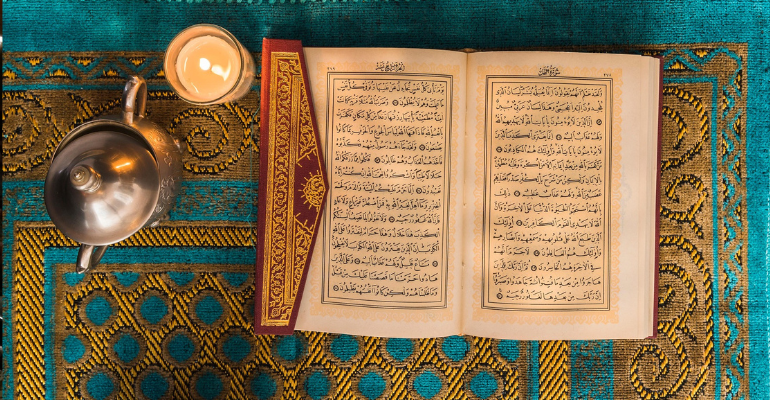In the name of Allāh, ar-Raḥmān (the most merciful), ar-Raḥīm (the bestower of mercy).
The month of Ramaḍān is a blessed month wherein the gates of Jannah are opened, the gates of Jahannam are closed, and the Shayāṭīn are chained. To attain the complete reward and benefit most from fasting, we must not only fulfil its obligations but also observe its etiquette and manners.
Below are some of the adab (etiquettes and manners) of fasting, along with their proofs:
1. Suḥūr – the morning meal.
Have suḥūr, for indeed suḥūr contains within it blessings. [1]
The difference between our fasting, and the fasting of the People of the Scriptures (i.e. the Jews and Christians) is [us] eating the suḥūr meal. [2]
Indeed Allāh and his angels praise those who eat the suḥūr meal. [3]
2. Beginning suḥūr with dates and water
How good are dates in the suḥūr of the believers. [4]
Have suḥūr, even if it be with a gulp of water. [5]
3. To delay suḥūr
Indeed we, the Prophets, were ordered to hasten in breaking the fast and delay our suḥūr. [6]
‘Amr ibn Maymūn mentioned, “the companions of Muḥammad ﷺ were the quickest of people to break their Fasts and the slowest in making suḥūr.” [7]
The meaning of delaying the suḥūr is to eat it within its time, however closer to the end time, and then pray Fajr.
4. To hasten ifṭār
The meaning of hastening the ifṭār is to break the fast within its time, however at the eariest opportunity, without any unncessary delay, and pray Maghrib.
The people will not cease to be upon goodness as long as they hasten in making ifṭār. [8]
This religion will not cease to be in ascendancy as long as the people hasten in making ifṭār; the Jews and Christians delay it. [9]
5. To break the fast with fresh dates, or dry dates before the Prayer
The Messenger of Allāh ﷺ used to break his fast with fresh dates before ṣalāh. If fresh dates were not present, then with dried dates. [10]
6. To supplicate whilst breaking the fast
The Messenger of Allāh ﷺ would say whilst breaking his fast,
ذَهَبَ الظَّمَأُ، وَابْتَلَّتِ الْعُرُوقُ، وَثَبَتَ الْأَجْرُ إِنْ شَاءَ اللَّهُ عَزَّ وَجَلَّ
‘The thirst has been quenched, the veins moistened and the reward in confirmed, if Allāh wills.’ [11]
7. Kindness, charity, good deeds and reciting the Qur’ān
The Messenger of Allāh ﷺ was the most generous of all people, and he would be most generous throughout Ramaḍān…Jibrīl would come to him every night in Ramaḍān and go through the Qur’ān with him. [12]
8. Striving in worship, especially in the last ten days
When the last ten days would come, the Prophet ﷺ would tighten his waistcloth (i.e. avoid relations with his wives), spend the nights in worship and wake his family. [13]
The Prophet ﷺ would strive in the last ten days unlike any striving in other days. [14]
9. Avoiding backbiting, lying, idle speech and insulting others
Fasting is not withholding from food and drink, rather it is withholding from idle speech and insults. If anybody insults you or acts ignorantly towards you then you should say, ‘I am fasting, I am fasting.’ [15]
Whoever does not leave off false speech and acting by it, then Allāh is in no need for that person to leave alone his food and drink. [16]
10. To serve a meal to those fasting
Whoever breaks the fast of a person [by offering him food] will be similar to him in reward, except that the reward of the one fasting will not be deficient in any way. [17]
11. To supplicate for the person who feeds you at ifṭār
The Prophet ﷺ would supplicate,
أفْطَرَ عِنْدَكُمُ الصَّائِمُونَ؛ وَأكَلَ طَعَامَكُمُ الأَبرَارُ، وَصَلَّتْ عَلَيْكُمُ المَلاَئِكَةُ
May the righteous eat your food, may the angels supplicate for you, and may fasting ones break fast in your house. [18]
12. Using the miswāk (brushing the teeth)
‘Āmir ibn Rabī‘ah, radiaAllāhu ‘anhu, said: “I saw the Messenger of Allah ﷺ using the siwāk countless times while he was fasting.” [19]
13. To pray nafl ṣalāh at night
The practice of the Muslims is to spend the day fasting, and a portion of the night in Qiyām al-Layl, prayed in congregation in the masjid, which is called tarawīḥ. The Prophet ﷺ said,
Whoever prays ṣalāh during the nights of Ramaḍān, with imān and hoping to attain the reward of Allāh, all his past sins will be forgiven. [20]
Compiled by Abul Abbaas Naveed
Nelson, Lancashire
Saturday, 22nd of Sha‘bān, 1432h
Corresponding to 23rd July, 2011
Footnotes
[1] Narrated by Anas bin Mālik; Collected by al-Bukhārī & Muslim.
[2] Narrated by ‘Amr ibn al-‘Aas; Collected by Muslim.
[3] Narrated by Ibn ‘Umar; Collected by Ṭabarānī.
[4] Narrated by Abu Hurayrah; Collected by Abu Dawūd.
[5] Narrated by Ibn ‘Umar; Collected by Ibn Ḥibbān.
[6] Narrated by Ibn ‘Abbās; Collected by Ibn Ḥibbān.
[7] Narrated by ‘Amr ibn Maymūn; Majma’ az-Zawāid.
[8] Narrated by Sahl ibn Sa’ad; Collected by al-Bukhārī & Muslim.
[9] Narrated by Abu Hurayrah; Collected by Abu Dawūd.
[10] Narrated by Anas bin Mālik; Collected by Aḥmad & Ḥākim.
[11] Narrated by Ibn Umar; Collected by Abu Dawūd & Ḥākim.
[12] Narrated by Ibn Abbās; Collected by al-Bukhārī & Muslim.
[13] Narrated by ‘Āishah; Collected by al-Bukhārī & Muslim.
[14] Narrated by ‘Āishah; Collected by Muslim.
[15] Narrated by Abu Hurayrah; Collected by Ibn Khuzaymah.
[16] Narrated by Abu Hurayrah; Collected by al-Bukhārī.
[17] Narrated by Zayd ibn Khālid; Collected by Tirmidhī & Nasāī.
[18] Narrated by Anas bin Mālik; Collected by Aḥmad.
[19] Narrated by ‘Āmir ibn Rabī’ah; Collected by Aḥmad & Abu Dawūd.
[20] Narrated by Abu Hurayrah; Collected by al-Bukhārī & Muslim.

